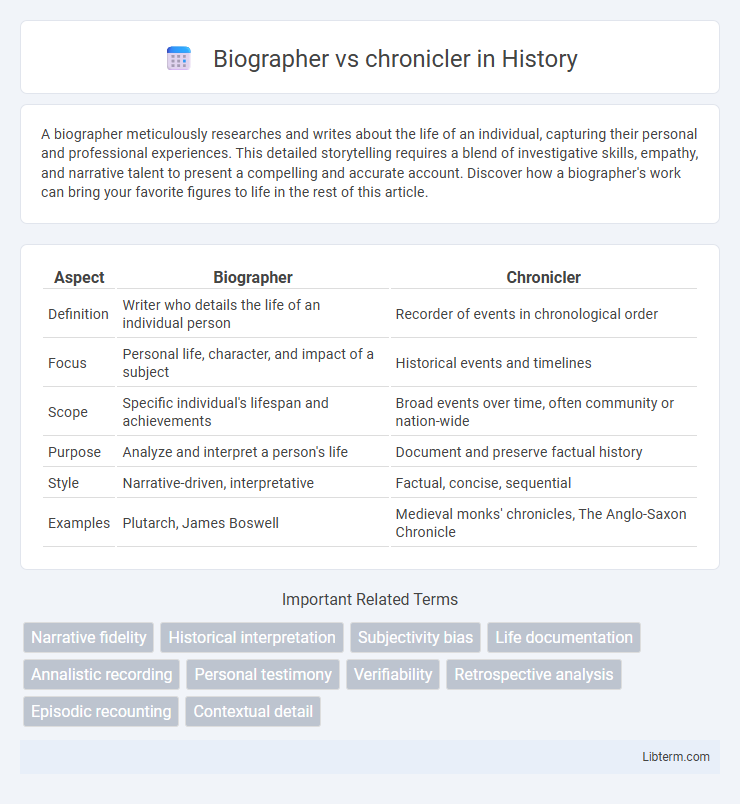A biographer meticulously researches and writes about the life of an individual, capturing their personal and professional experiences. This detailed storytelling requires a blend of investigative skills, empathy, and narrative talent to present a compelling and accurate account. Discover how a biographer's work can bring your favorite figures to life in the rest of this article.
Table of Comparison
| Aspect | Biographer | Chronicler |
|---|---|---|
| Definition | Writer who details the life of an individual person | Recorder of events in chronological order |
| Focus | Personal life, character, and impact of a subject | Historical events and timelines |
| Scope | Specific individual's lifespan and achievements | Broad events over time, often community or nation-wide |
| Purpose | Analyze and interpret a person's life | Document and preserve factual history |
| Style | Narrative-driven, interpretative | Factual, concise, sequential |
| Examples | Plutarch, James Boswell | Medieval monks' chronicles, The Anglo-Saxon Chronicle |
Introduction to Biographers and Chroniclers
Biographers specialize in detailed, narrative accounts of an individual's life, emphasizing personal experiences, motivations, and character development. Chroniclers document events in chronological order, offering factual and objective records often without deep analysis. Understanding the distinction between biographers and chroniclers is essential for appreciating how personal stories and historical events are conveyed through different storytelling approaches.
Defining the Role of a Biographer
A biographer meticulously researches and interprets an individual's life, emphasizing personal experiences, motivations, and character development to present a comprehensive and nuanced portrayal. Unlike a chronicler who records events in chronological order, a biographer analyzes and connects significant life moments to provide deeper insight into the subject's influence and legacy. The role demands critical evaluation of sources, contextual understanding, and narrative skill to create an engaging and accurate life story.
Understanding the Chronicler’s Perspective
The chronicler's perspective emphasizes recording events as they happen, prioritizing accuracy and chronological order over personal interpretation or analysis. Unlike biographers who delve into motives and character development, chroniclers present a factual, sequential account often relying on primary sources and eyewitness testimony. This approach provides a foundational, objective narrative that serves as a crucial resource for historians seeking to reconstruct past events.
Purpose and Objectives: Biography vs Chronicle
A biographer aims to explore the life, personality, and motivations of an individual, providing an in-depth analysis of their experiences and significance. In contrast, a chronicler focuses on recording events in chronological order, emphasizing factual accuracy and historical context without deep personal interpretation. The purpose of a biography is to offer insight into the subject's character and impact, while a chronicle seeks to document and preserve a sequence of events for historical record.
Methods of Gathering Information
Biographers collect information through extensive research, including interviews, personal letters, diaries, and archival documents, to construct a detailed narrative of an individual's life. Chroniclers rely primarily on contemporaneous records, such as official documents, eyewitness accounts, and historical events, focusing on accurate, chronological reporting. The method of information gathering distinguishes biographers' interpretive storytelling from chroniclers' factual documentation.
Narrative Style Differences
Biographers focus on creating a detailed, interpretive narrative that explores the subject's character, motivations, and personal experiences, often with psychological insight. Chroniclers maintain a factual, chronological record of events without extensive analysis or emotional depth, emphasizing accuracy and continuity. The biographical narrative is subjective and thematic, while the chronicler's style is objective and event-driven.
Historical Accuracy and Interpretation
Biographers prioritize historical accuracy by thoroughly researching an individual's life, relying on primary sources and documented evidence to interpret events and motivations with depth. Chroniclers focus on recording events in chronological order, often emphasizing factual recounting without extensive analysis or interpretation. The biographer's approach allows for nuanced understanding, while chroniclers provide a more straightforward, less interpretive historical record.
Impact on Readers and Historical Record
Biographers provide in-depth, personalized insights into an individual's life, offering readers emotional connections and nuanced understanding that shape historical perspectives. Chroniclers document events in chronological order, preserving factual accuracy and context crucial for historical records and research. The impact on readers varies as biographers engage empathy and interpretation, while chroniclers ensure comprehensive event preservation for future analysis.
Famous Biographers and Renowned Chroniclers
Famous biographers such as Walter Isaacson and David McCullough provide in-depth, narrative-driven accounts of notable individuals' lives, emphasizing personal motivations and historical impact. Renowned chroniclers like Herodotus and Jean Froissart specialize in recording events in a chronological order, offering detailed, fact-based accounts of historical periods and major occurrences. While biographers focus on character development and thematic storytelling, chroniclers prioritize precise documentation and sequence of events.
Choosing Between a Biographical or Chronological Approach
Choosing between a biographical or chronological approach involves assessing whether to prioritize detailed personal insights or a linear sequence of events. A biographical method emphasizes an individual's personality, motivations, and significant life moments, ideal for in-depth character studies. In contrast, a chronological approach offers a structured timeline, useful for understanding historical context and the progression of events over time.
Biographer Infographic

 libterm.com
libterm.com